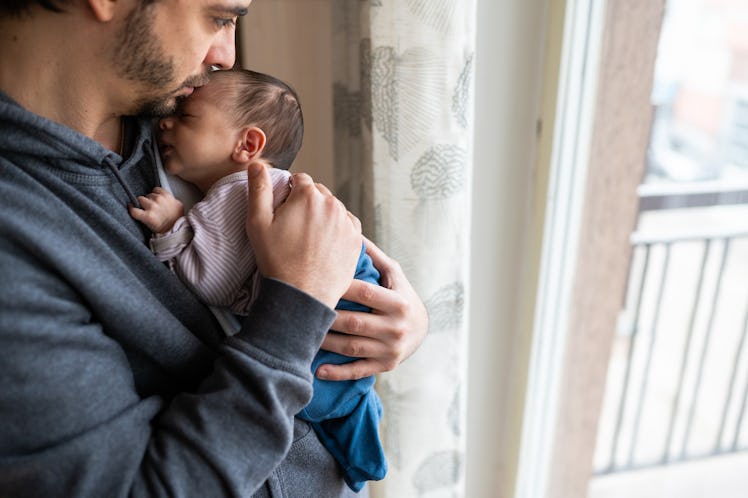Paid Parental Leave Could Save Nearly 1,000 Babies' Lives Per Year
A mandated 12-week paid parental leave nationwide could save lives, according to a new study.

The U.S. is the only industrialized country in the world that doesn’t mandate paid parental leave. If you’ve been following the news, you know it’s a contentious subject. Paid parental leave was struck from Biden’s Build Back Better plan — the country’s best chance at making paid leave federal policy — because of Republican opposition and pushback from Democratic Senator Joe Manchin. That’s the case even though paid parental leave decreases poverty risk among new parents, improves bonding both with the baby and between partners, and overall enhances parent and child health. A new study shows that paid parental leave actually saves lives too.
Although the U.S. doesn’t mandate paid parental leave, 11 states and the District of Columbia do. California became the first state to do so when it’s paid parental leave policy was enacted in 2004. By analyzing the before-and-after in California and comparing it to the rest of the country, the study researchers determined that California’s 6-week paid parental leave avoided 339 infant deaths in just the four years after implementation.
“Paid family leave could save infant lives,” says Feng Chen, Ph.D., an incoming assistant professor at Liaoning University in China and lead author of the paper.
According to the researchers’ estimations, a guarantee of three months of paid parental leave across the whole of the U.S. could save nearly a thousand babies’ lives per year.
Chen, who worked on this project as a researcher at Tulane University, pored over data from the National Center for Health Statistics collected between 2000 and 2008 from more than half a million mothers and their babies — including how many of those babies died. (He also looked at dads who took leave, but only a small percentage of eligible fathers took it.) Then he factored in characteristics of the children and parents, like birth weight, sex, age, race, and marital status. Comparing the data from California with the data from the other 49 U.S. states, which at the time didn’t mandate paid parental leave, amounted to a statistical analysis looking into a total of more than 36 million births.
What Chen found is that after California mandated paid family leave, the state’s infant mortality rate dropped. In fact, those years saw 339 fewer infant deaths in California than would have been expected pre-parental leave. Specifically, there were fewer infant deaths related to health complications after the policy was enacted.
Infant boys felt the benefits more than girls. Infant mortality is often higher in boys than girls due to biological characteristics that make infectious disease more common, for example. So the benefits of paid parental leave could possibly have a bigger effect on protecting more vulnerable infants.
If the U.S. were to mandate three months of paid parental leave, the researchers estimate that 972 infant lives could be saved per year. This relies on some strong assumptions, Chen notes, like that the more paid parental leave, the more the benefit, and that the effect is the same in California as across the whole nation. Still, this estimate shows just how great the impact could be.
There are plenty of reasons why paid parental leave benefits parent and child health, Chen notes. That economic support allows parents to spend more on their children’s health. If a mom is home from work, it’s easier for them to breastfeed, which has been linked to reduced infant death. Paid leave improves parents’ mental health, meaning they can better attend to their children. It improves their physical health too; there’s a 51% decrease in rehospitalization for mothers when they have paid time off, according to a 2018 study. Lastly, getting to be home with your infant means you’re more likely to spot any healthcare problems right away and arrange for medical care accordingly, nipping most complications in the bud before they can spiral out of control.
“The findings are consistent with other studies that have looked at international and state-level samples,” says Darby Saxbe, Ph.D., a professor of psychology at the University of Southern California who specializes in family relationships and was not involved in the new study. “This points to an important conclusion: When parents have more time to rest and bond with their infants after birth, they can be more attentive to health concerns and are able to provide higher-quality care.”
Paid family leave promotes mental and physical health in multiple ways, some of which are subtle and long-term, Saxbe says. “So this particular result, which focuses specifically on infant mortality, is just the tip of the iceberg in my opinion.”
The more time parents spend on paid leave, the more infants lives will be saved, Chen speculates. However, experts don’t yet know what length of paid family leave grants the most benefits. “The optimal length of leave might be different for families with different socioeconomic statuses,” Chen says.
“This paper has policy implications for national paid family leave programs that are under review, such as the Family and Medical Insurance Leave Act and the American Families Plan,” Chen notes. And the evidence keeps piling up in favor of them.